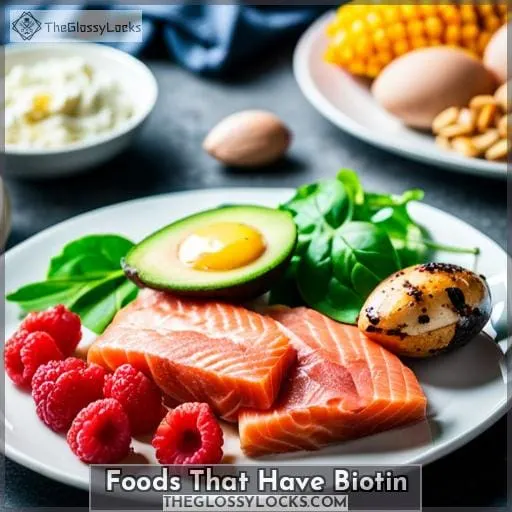This site is supported by our readers. We may earn a commission, at no cost to you, if you purchase through links.

In this article, we’ll provide you with all the facts and knowledge necessary so that your efforts pay off.
Table Of Contents
Key Takeaways
- The best time to take biotin is in the morning or mid-day to avoid sleep disruption.
- Biotin supplements should be taken daily to obtain the full benefits.
- Plant-based capsules are recommended for biotin supplementation.
- Consultation with a doctor is advisable before starting biotin, especially for pregnant women or individuals with medical conditions.
What is Biotin?
Biotin is a B vitamin that helps with energy metabolism, tissue health, hair/skin/nails, immune function, and more – so you can boost your well-being in many ways. It’s essential for healthy hair growth and nail health, but it can also help regulate glucose control and reduce pregnancy risks.
Additionally, biotin aids in the functioning of various metabolic processes such as fatty acid synthesis, which are important for overall bodily functions. For these reasons, it’s recommended to take biotin supplements daily over time to get the most benefit from its properties – particularly if you’re looking to improve your hair quality or nail condition.
Plant-based capsules without additives tend to be best since they are easily absorbed by our bodies, yet not too powerful or dangerous like some other forms of this nutrient might be.
With proper care taken into account when taking any supplement, there’s no reason why adding this particular one couldn’t help bring about some significant improvements!
Benefits of Biotin
You may have heard of biotin as a popular supplement for healthy hair and nails, but it does much more than that. Biotin is an essential vitamin for many functions in the body, such as boosting metabolism and supporting the immune system.
Supports Immune Function
You can support your immune system by taking biotin. It helps with tissue health and metabolism, plus boosts B vitamins in the body.
- The immune effects of vitamin B7 play a role in gastric absorption.
- Dietary sources of biotin include eggs, liver, salmon, and seeds.
- Risk factors for pregnant women should be considered before use.
- The nervous system may benefit from increased vitamin B7 intake. Taking biotin daily over time is one way to help boost immunity without any dangerous side effects or disruption to sleep patterns.
May Support Healthy Hair and Nails
Taking biotin daily can help promote healthier hair and nails. Split ends, dull texture, lackluster nails? Biotin may be the answer; it’s found in dietary sources like eggs and liver but is also available as a supplement.
It helps with scalp health, nail growth, and skin, plus supports hair growth by providing essential nutrients for strong strands.
Boosts Metabolism
Boosting your metabolism with biotin can help you maintain a healthy weight and improve glucose control. It assists the body in absorbing nutrients from food, supports hair growth, and strengthens nails.
Eating foods rich in biotin or taking a supplement are great options. Eggs, salmon, and seeds are all good sources of this vitamin. For best results, take it daily over time, but consult with a doctor before starting, especially if you have a medical condition or are pregnant.
Taking biotin regularly will give your metabolism an extra boost!
Essential for Pregnancy
Biotin is essential for pregnant women – helping develop a healthy baby, providing energy, and promoting maternal health. Pregnancy nutrition includes biotin-rich foods like sweet potatoes and prenatal vitamins with a maximum dose of 5,000mcg/day.
Hair loss may occur, but excess water-soluble biotin is easily excreted, posing no danger to the fetus or the mother.
Regulates Blood Sugar
By regulating blood sugar, you can help your body remain balanced. Proactively manage carbohydrate intake and exercise as these play a role in controlling levels. Biotin can reduce cravings and mouth swelling while boosting insulin sensitivity.
When is the Best Time to Take Biotin?
Now that you know the benefits of biotin, it’s important to consider when is the best time to take it. Generally speaking, morning or mid-day is recommended because taking it at night can disrupt sleep.
If taken on an empty stomach and nausea occurs, then a light meal should be eaten beforehand.
For hair growth specifically, experts recommend consuming 5,000 mcg daily over a period of 1-2 months for optimal results. However, there is no set amount as everyone’s body absorbs differently depending on age and other factors.
Dietary sources include eggs (especially egg yolks), salmon, organ meats such as beef liver, and kidney beans. Supplemental forms come in capsules either with or without additives, so consult your doctor before starting any regimen, especially if pregnant or have medical condition(s).
As biotin is water-soluble, excess will be excreted from your body. But remember not to take this vitamin instead of medical advice prescribed by healthcare professionals for baldness causes, etc. It also does not increase strand numbers but may help with age-related thinning issues like brittle nails and sluggish metabolism/poor glucose control.
Take daily over time for best results!
The Basics of Biotin for Hair Growth
You may have heard about biotin for hair growth, and the research backs it up – in as little as 1-2 months, taking 5,000 mcg daily of this water-soluble B vitamin can help improve age-related hair thinning.
It’s important to note that excess biotin is not dangerous and there is no set safe dose. However, consult a doctor before starting if pregnant or having medical conditions.
Food sources include eggs, liver, salmon, seeds, potato, cheese, and yogurt, which provide an alternative way of getting your daily requirement without supplements if desired.
While it won’t increase the number of strands on your head, its properties are beneficial for brittle nails, sluggish metabolism, and poor glucose control, so you get more than just healthy locks from taking biotin regularly over time!
Fast Facts of Biotin for Hair Growth
Biotin is an essential nutrient that can help promote healthy hair growth. It’s important to understand what biotin does for your hair, how it works, and the best ways to get more of it into your diet.
Additionally, understanding how much biotin you need, when the results will start showing, and any potential side effects from taking too many supplements are all key points in deciding whether or not this vitamin is right for you.
What Does Biotin Do for Your Hair?
Biotin has many benefits for hair growth, such as increasing elasticity and thickness of existing strands. Research shows that taking 5,000 mcg daily can make hair look healthier in 1-2 months! It also helps with prenatal care, nail health, glucose control, and immune function.
Take biotin to reduce the risk of age-related hair loss and enjoy stronger nails and better metabolic performance.
What Are the Ways to Add More Biotin to Your Diet?
Boost your biotin intake naturally with food sources like eggs, salmon, and cheese to nourish your hair from the inside out. Incorporate fortified foods into your diet or take dietary supplements for an extra boost.
Avoid processed foods that contain additives which may interfere with the absorption of vitamins; instead, opt for raw dairy products and fresh vegetables.
How Much Biotin is Needed for Hair Growth?
For optimal hair growth, the recommended daily dose of biotin is 5,000 mcg – and it may take 1-2 months to see results. Hair loss, glucose control, skin health, biotin sources, and immune function are all important factors.
Achieving healthy locks requires regular intake of this vitamin; food sources such as eggs, salmon, and seeds can help supplement levels naturally.
How Long Does It Take for Biotin Intake to Show Results?
It typically takes 1-2 months of consistent biotin intake for you to start seeing results. For optimal dosing duration and timing, take 5,000 mcg daily with food. Aim for meals that include biotin-rich foods like eggs, salmon, or seeds.
Are There Any Side Effects to Taking Too Many Biotin Supplements?
You should be aware that taking excessive biotin supplements can have adverse effects on your health, so proceed with caution to ensure you’re reaping the benefits without putting yourself at risk. Know the dosage amounts and natural sources. Consider long-term use and any potential drug interactions for optimal hair benefits.
How Much Biotin to Take Daily
Daily doses of biotin for hair growth range from 5,000 mcg to get the benefits, but it’s important to consult your doctor before starting. It’s recommended that pregnant women do not take biotin as a supplement, and those with autoimmune hair loss should seek medical treatment instead.
Biotin can help with age-related thinning, but it won’t increase strand number or act as an alternative to proper medical care.
Food sources like eggs, liver, salmon, and seeds are also great options for getting enough biotin into the diet. Eggs contain high levels of sulfur, which is essential in promoting healthy nails and skin.
Liver is full of Vitamin A, which helps promote healthier-looking locks. Salmon has omega-3 fatty acids that improve scalp health. Seeds, such as sunflower, provide necessary nutrients like zinc required for follicle strength.
Taking daily doses over time will produce the best results when it comes to improving overall tissue health, along with stronger nails, while keeping energy metabolism on track too. Plant-based capsules without additives are a good option if supplementation is desired.
Maximum Safe Dose
The maximum safe dose of biotin is 10,000 mcg per day. However, taking more than the recommended 5,000 mcg will not necessarily increase hair growth. Instead, it can have other side effects such as skin rashes and a decrease in appetite.
It’s important to be aware of dosing limits and safety concerns when considering supplementation with biotin. Overdosing is possible if taken in excess amounts for extended periods or consuming large quantities from food sources too quickly.
There are various types of supplements available that contain biotin, including plant-based capsules without additives. These are often preferred due to their purity and lack of additional ingredients such as fillers or binders that could interfere with absorption rates into the body.
Food sources like eggs, liver, salmon, seeds, potato, cheese, and yogurt also provide viable options for supplementing your diet naturally with this essential vitamin complex.
Foods That Have Biotin
Enjoy the benefits of biotin with foods such as eggs, liver, salmon, and more! To get your daily dose of this essential B vitamin, add some fried eggs to a breakfast omelette or whip up a batch of delicious liver pate for lunch.
A juicy salmon steak makes an excellent dinner option, while snacking on sunflower seeds throughout the day is also beneficial.
These five food sources are all great natural ways to enjoy biotin’s many positive effects on hair growth, health, skin/nails, immune system, metabolism, glucose control, and pregnancy support. Plus, they’re tasty too! Eating these items regularly (in moderation) can provide long-term health benefits without needing to take supplements or additional vitamins.
There’s no need to worry about overdosing either since excess biotin is quickly excreted from the body through urine anyway.
Frequently Asked Questions (FAQs)
Can I take biotin if I’m pregnant?
Consult your doctor before taking biotin while pregnant. Excess is excreted, but it’s best to be cautious; a balanced diet with food sources like eggs, liver, and salmon may provide enough for safe consumption.
Make sure you get the right dosage and form of supplement to ensure safety and effectiveness.
Does biotin increase the number of hair strands?
No, biotin does not increase the number of hair strands. It can help with age-related thinning but won’t affect autoimmune hair loss. Take it daily for best results and consult your doctor if pregnant or have medical conditions.
Is it safe to take biotin for long periods of time?
Yes, it is safe to take biotin for long periods of time. It has no known toxic effects, and excess amounts are excreted in your urine. Consult a doctor if you are taking other medications or have any medical conditions before starting supplementation.
Are there any side effects associated with biotin?
Biotin is generally safe with few side effects. Taking too much could cause skin rashes, digestive upset, and mild headaches. Consult your doctor if you experience any of these symptoms or have a medical condition before taking biotin supplements.
Are there plant-based biotin supplements available?
Yes, plant-based biotin supplements are available. Look for capsules without additives and take them daily over time for best results – your body will naturally excrete any excess. Consult a doctor before starting or if pregnant/have a medical condition to ensure safety.
Conclusion
It’s clear that biotin is an essential nutrient for many bodily functions, and it can be beneficial to add it to your daily routine. Studies have revealed that taking 5,000 mcg of biotin daily can help improve hair growth, and it may take up to two months to see results.
Interestingly, the exact best time to take biotin is not set in stone, but many experts recommend taking it in the morning or mid-day to avoid sleep disruption. However, it’s important to consult your doctor before taking biotin supplements, especially if you’re pregnant or have any existing medical conditions.
With the right daily dose and food sources, biotin can help boost your metabolism, regulate blood sugar, and support healthy hair and nails. So, if you’re looking to get the most out of your biotin intake, make sure to take it at the right time and in the right dose for optimal results.










